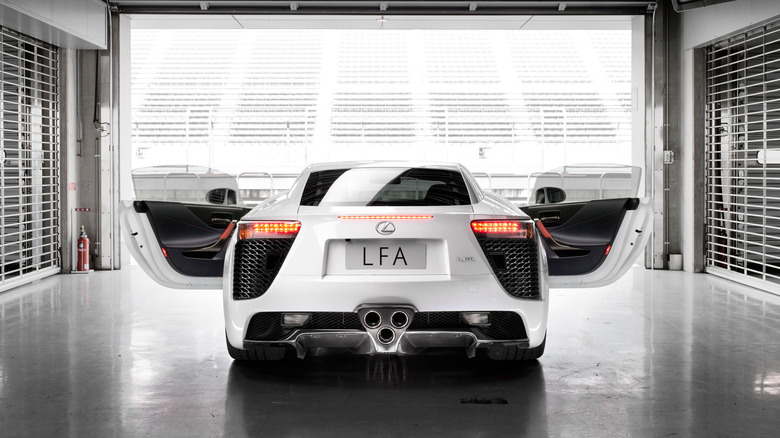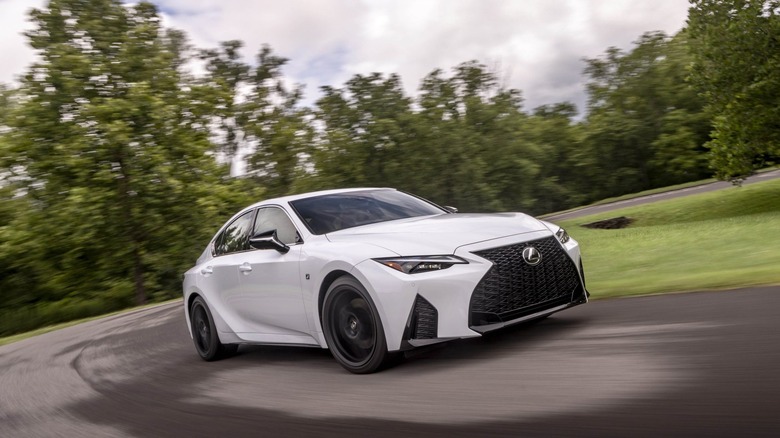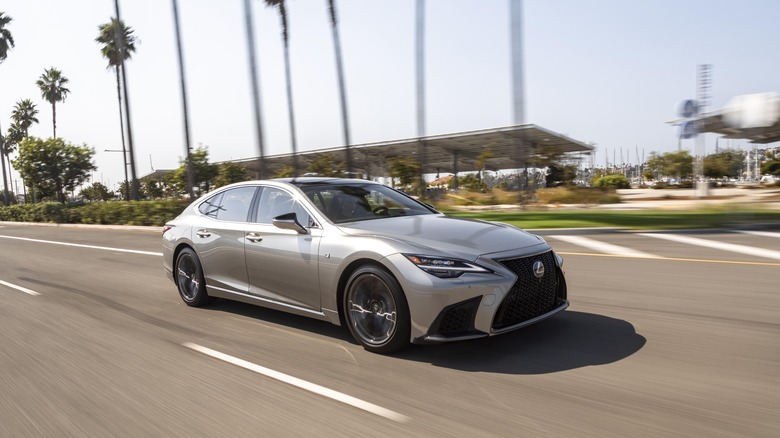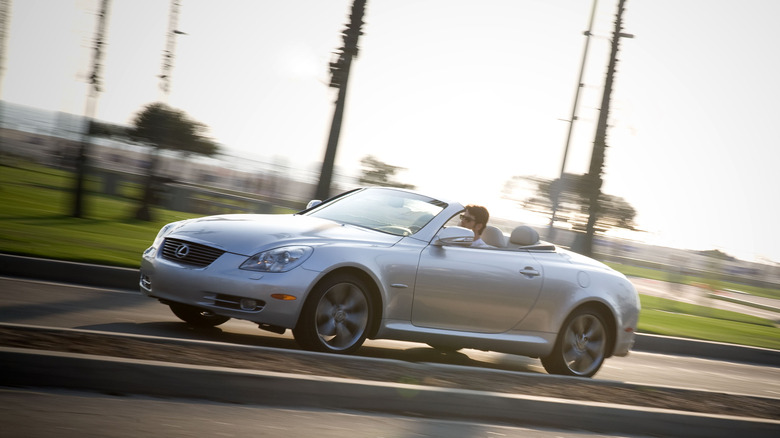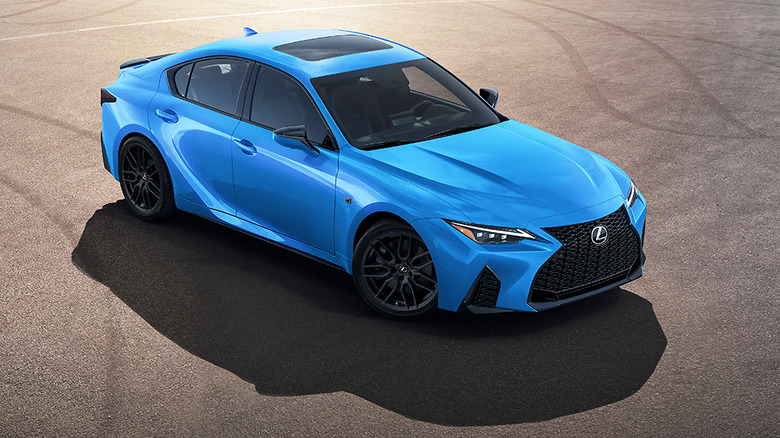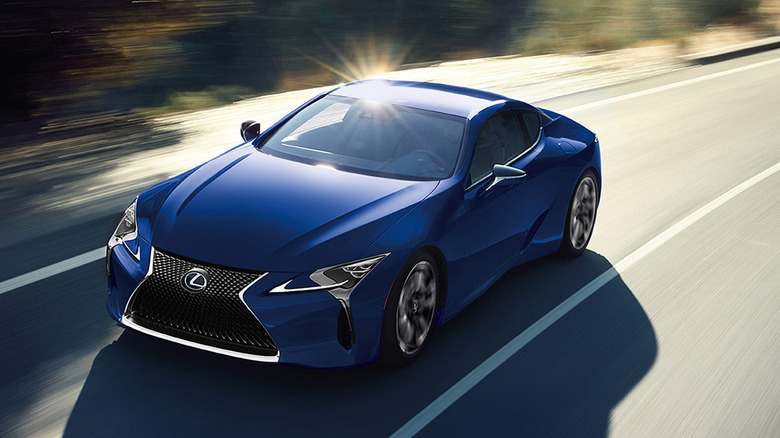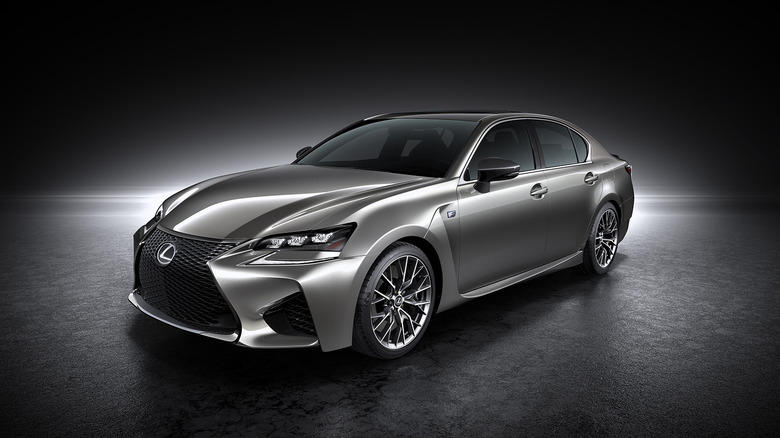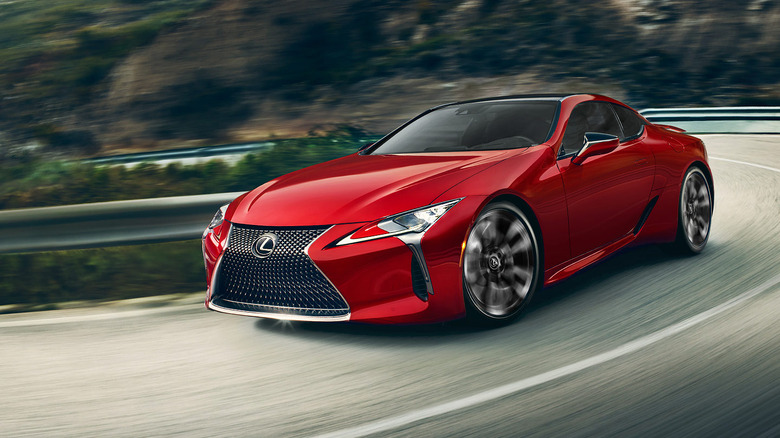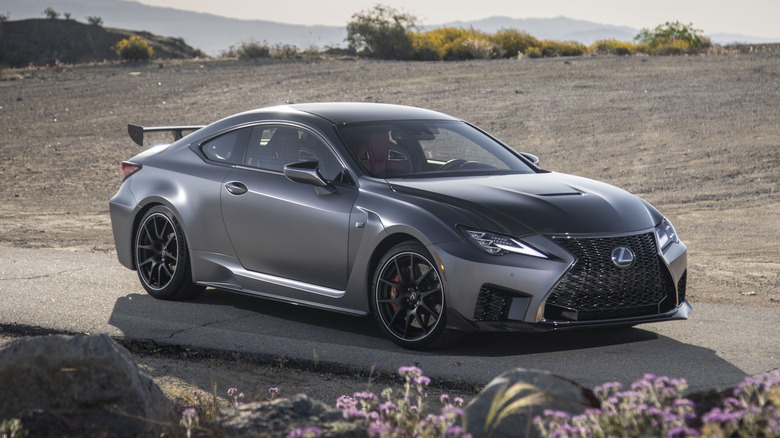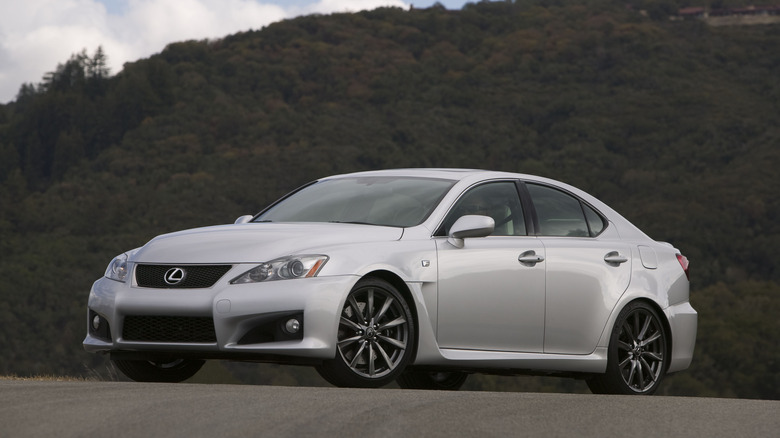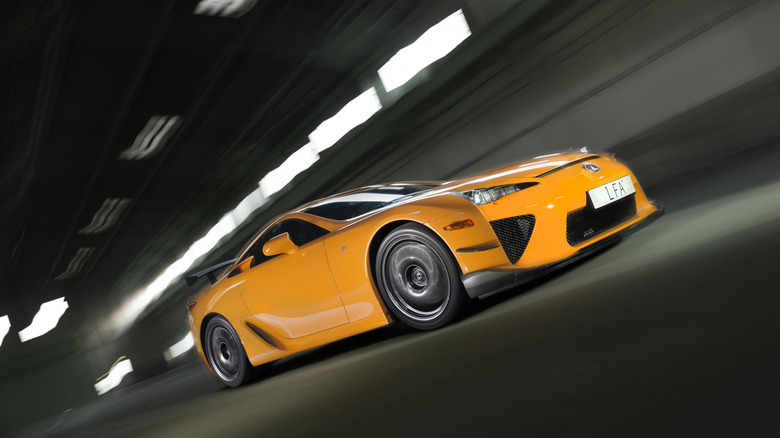The 10 Fastest Lexus Cars Ever Made, Ranked
Lexus is one of the most popular luxury automakers globally today despite being less than four decades old. When Toyota launched it as its luxury sub-brand with the first-gen LS 400 in 1989, it put a lot of money and effort into out-engineering its German rivals. The Japanese automaker succeeded, creating a groundbreaking luxury sedan that was a step above its rivals.
Since the LS 400, Lexus launched several new models, including the ES, GS, and SC. However, each one of those vehicles was designed primarily with comfort and luxury in mind. There was none of the sportiness associated with German counterparts like the AMG and BMW M cars. Lexus needed to change that to remain competitive, particularly among the younger demographic, and launched its in-house "F" motorsport division with the IS F. Since then, Lexus vehicles have steadily become quicker and more interesting to drive. Maybe not as fast as the German competition, but today, there are definitely a dozen Lexus cars that can satisfy your need for speed.
But which Lexus cars are the fastest? You are in the right place to get your answer! Acceleration and top speed both play a role here; if we only ranked the cars by the latter, the first-gen LS 400 and its 155 mph top speed would grant it a place here despite taking 7.9 seconds to 60 mph. So, let's begin!
10. 2024 Lexus IS 350 (0-60 mph in 5.6 seconds, 143 mph)
The IS 350 is one of the last sports sedans in North America to feature a naturally aspirated engine. The 3.5-liter V6 unit produces 311 hp at 6,600 rpm and 280 lb-ft at 4,800 rpm. Not incredibly high by modern standards, as the BMW 340i, for example, has a 3.0-liter turbocharged inline-six that makes a whopping 382 hp and 369 lb-ft of torque, aided by a 48-volt mild-hybrid system for better throttle response. As a result, the Bavarian sedan hits 60 mph in just 4.1 seconds!
However, looking at Lexus' V6 just by the numbers would be doing it a disservice. While it is down on power, with acceleration figures only comparable to four-cylinder turbocharged engines, this is an incredibly smooth unit that sounds quite nice, giving you a vibe that most turbocharged sports sedans can't match. Crucially, it has also proven to be reliable and durable and less susceptible to breakdowns due to infrequent maintenance. A supercharged form of the same engine is even used in Lotus' Exige, Evora, and Emira sports cars, which certainly says something about its toughness.
Let's also not forget that the IS 350 remains a value proposition in its category, costing as much as competitors with four-cylinder buzzers under the front bonnet. So, you might not enjoy sports-car-like acceleration in the IS 350, but the smoothness and refinement of its engine are hard to beat!
9. 2024 Lexus LS 500 (0-60 mph in 4.6 seconds, 136 mph)
Lexus' flagship sedan, the LS 500, didn't follow the same recipe as its smaller brother. Namely, for this LS, Lexus replaced its naturally-aspirated 4.6-liter V8 with a 3.4-liter twin-turbo V6, a move that was welcomed with the same negativity as replacing six-cylinder engines with four-cylinder ones. With the LS, that was even more pronounced, as the V8 is famous for its smoothness and reliability.
Even so, the twin-turbo V6 impressed us in our first drive of the 2018 LS500, particularly with its smooth power delivery and good performance. In fact, it's one of the highest-accelerating Lexus cars of all time, almost as quick as the GS F performance sedan to 60 mph. Interestingly, Lexus limited the top speed to 136 mph in the North American model, but across the Atlantic, even the less powerful LS 500h hybrid won't stop until the needle hits 155 mph.
Those performance numbers are not surprising, mind you, as the modern unit has 416 hp at 6,000 rpm and strong 442 lb-ft of torque at 1,600 rpm at its disposal. The engine is accompanied by a 10-speed automatic, which might be two gears too much, but it probably aids with acceleration. The LS 500 also has a high-quality cabin with a ton of space for passengers, but its interior tech can't hold a candle to what the competition offers. Perhaps this will change if the next generation spawns an EV variant, as Lexus plans to go all-electric by 2035.
8. 2010 Lexus SC 430 (0-60 mph in 5.8 seconds, 149 mph)
From being termed the worst car in history to being resurrected as a smooth and stylish second-hand luxury convertible, the SC 430 has had quite a wild ride. Still, you can't argue its credentials. Under its sleek and voluptuous body, the SC 430 hides a rear-wheel-drive architecture with a naturally aspirated V8 hiding behind the bonnet. Imagine it as the Japanese SL 550, albeit with a more sedate design and less power, and you won't be far off.
The SC 430 might lack the aggressiveness of its German competition, but it makes up for that in other areas. Notably, it is one of the most reliable convertibles you can buy and among the most reliable Lexus cars ever made. That is particularly true for the 4.3-liter V8 engine under the hood, which is one of the most durable engines the Toyota Motor Corporation has ever made. It is a bit underpowered by today's standards, producing 288 hp at 5,600 rpm and 317 lb-ft of torque at 3,400 rpm, but that's still enough for the SC 430 to be on this list — and perhaps also a sign that Lexus is not the brand for those seeking speed.
However, the SC 430 was never built for speed. It's a luxurious 2+2 convertible cruiser that pampers you with a buttery-smooth ride and plush interior. This is not a car to attack corners with, but one that lets you relax, soak up the sun, and enjoy the ride.
7. 2024 Lexus IS 500 F Sport Performance (0-60 mph in 4.4 seconds, 149 mph)
Lexus' insistence on keeping its naturally aspirated engines alive might hurt its competitiveness in performance and economy, but it gives us memorable cars like the latest IS 500. This is not the fastest sports sedan on the market, nor the sharpest in the corners. However, the 5.0-liter V8 sitting under its bulged front bonnet is quite unique. The naturally aspirated unit provides an aural sensation that's far and above what the competition offers, exponentially enhancing the driving experience.
Due to the lack of turbocharging torque, the IS 500 won't be winning traffic light races. It's even slower to 60 mph than the BMW M340i, let alone the M3. Still, with 472 hp at 7,100 rpm and 395 lb-ft of torque at 4,800 rpm on tap, the IS 500 F Sport Performance is certainly no slouch, hitting 60 mph in 4.4 seconds. Unlike most modern sports sedans, you'll even get to rev the engine out to 7,300 rpm! This sharp-looking sports sedan also performs well in the corners while retaining Lexus' refined ride.
The IS 500 shows what exactly we are lacking from modern sports sedans. Sure, cars are much quicker today than they were a decade ago, but the transformation to turbocharged and electrified powertrains also cushioned some of the experience. With a positive V8 spin, the IS 500 tries to slow down that transformation.
6. 2024 Lexus LC 500h (0-60 mph in 4.7 seconds, 155 mph)
The Lexus LC is one of the most attractive grand-touring coupes on sale and also frequently recommended as a steal in today's automotive landscape. But all those things apply only to the V8-powered LC 500. The hybrid-V6 LC 500h doesn't get nearly as much attention. Not because it's slow — it gets to 60 mph almost as quickly as the V8, but because it lacks the sense of occasion.
To begin with, the 3.5-liter V6 under the bonnet sounds much tamer, but the gearbox is what really muddles the experience. Lexus opted for a combination of a four-speed automatic and e-CVT, both working together to deliver 10 gear shifts to the driver. You even get to play with magnesium paddle shifters, which feel like they came from a much more expensive vehicle. However, the shift quality is nowhere near as snappy. There is still that rubber-band acceleration you get from a CVT, with the engine remaining at the top of the rev range for most of the time.
There are still positives. The LC 500h gets 29 mpg combined, unthinkable for a grand-touring coupe. Its interior is amazing, too, with plush materials, excellent build quality, and great attention to detail. Oh, and until you start the hybrid powertrain, most won't know that you don't have the V8, as it looks just as striking.
5. 2020 Lexus GS F (0-60 mph in 4.5 seconds, 168 mph)
The GS F is Lexus' last true performance sedan and the last mid-size Lexus vehicle sitting on an RWD platform (replaced by the FWD ES). Perhaps the company will reconsider giving enthusiasts fun-to-drive sedans once again — we found the GS F to be one hell of a machine, ready to tackle the track and then bring you home in comfortable fashion.
When Lexus launched the GS F in 2015, it was down in horsepower to its German rivals by a significant margin. That's because this aggressive-looking executive sedan doesn't have any forced induction. Instead, it packs the same 5.0-liter naturally-aspirated V8 as most cars on this list, pumping out 467 hp at 7,100 rpm and 389 lb-ft of torque at 4,800-5,600 rpm. So, like most Lexus performance cars, it won't beat the competition at the traffic light, but it might put a bigger smile on your face. And isn't that what fun cars are all about?
Besides, the GS F is not a slow car. Lexus decided to limit the top speed to 168 mph, so you get to experience a bit of that motion blur. Even so, the GS F is not about top speed or acceleration. It's pretty light for an executive performance sedan and has a tricky torque vectoring differential (TVD) in the back, allowing sports-car-like agile handling. That, along with the sweet-sounding V8, is what makes the GS F special.
4. 2024. Lexus LC 500 (0-60 mph in 4.4 seconds, 168 mph)
The GS F was discontinued in 2020, but the Japanese luxury brand at least still offers the LC 500. It's undoubtedly the most beautiful car in the Lexus range, with a striking design that draws the eye. It's attractive inside, too, and boasts plush materials assembled tightly together. There is even a convertible model, which looks gorgeous with the top down.
The star of the show, though, is the same 5.0-liter V8 we've mentioned repeatedly, in this iteration producing 471 hp. The acceleration it provides is solid but far behind most modern grand tourers, most of which have turbocharged engines. For instance, the latest Mercedes-AMG SL 55 Roadster packs a 4.0-liter bi-turbo V8, good for 469 hp and massive 516 lb-ft of torque. As a result, 0-60 mph in the Merc takes only 3.8 seconds, compared to 4.4 in the LC 500.
But before you make fun of the LC 500 online, keep in mind that the Lexus coupe/convertible is a steal. Heck, a V8-powered LC 500 is cheaper than an AMG SL 43 with a four-cylinder turbo. So, for the money, you are really getting something special here. No other carmaker offers such a unique grand-touring machine at the moment, particularly not one that offers a holistic experience that tickles each one of your senses. No wonder our own Chris Davies gave the LC 500 an "Editor's Choice" award when he tested it this year.
3. 2024 Lexus RC F Track Edition (0-60 mph in 3.96 seconds, 168 mph)
The LC 500 is not the only fast Lexus coupe still on sale, as the company also still sells the RC F, allowing it to claim it has multiple performance cars on offer. In reality, the RC F is getting a little long in the tooth, with Lexus first showing it to the world at the 2014 North American Auto Show (NAIAS) in Detroit. Yes, that's almost a decade on the market for a coupe that was not very competitive even when it was launched.
The biggest problem is its heavy platform; the RC F borrows the front end from the IS and the rear from the GS, resulting in a curb weight of almost 4,000 pounds. For comparison, the previous-gen BMW M4 F82 weighs around 3,300 pounds, resulting in a much quicker 0-60 mph time of 4.1 seconds, compared to 4.4 seconds for the Lexus. That is despite the fact that the RC F is up on power: 467 hp vs. 431 hp. And don't get us started on the new M4!
Fortunately, Lexus has improved the formula over the years, with the latest RC F track edition employing weight-saving measures (down 176 pounds compared to the launch model) and shorter differential gearing to improve performance. Its engine also has five more horsepower, resulting in a quicker 0-60 sprint of 3.96 seconds. Then again, its saving grace is the sweet-sounding V8, particularly above 3,500 rpm.
2. 2014 Lexus IS F (0-60 mph in 4.6 seconds, 170 mph)
The fact that Lexus' first "F" model, the IS F, is its second-fastest ever made, topping at 170 mph, makes us wonder whether the Japanese brand has any interest in competing at the highest level. Perhaps the rumored next-gen grand-touring coupe from Lexus will finally break the ice with its twin-turbo V6 hybrid. For now, though, the fastest attainable Lexus you can buy is the first-gen IS F.
Still, provided you are interested in V8 performance sedans that resemble muscle cars, the IS F is an interesting choice. Its 5.0-liter V8 is down on power to newer versions of the engine, producing 416 hp at 6,600 rpm and 371 lb-ft at 5,200 rpm. Still, the IS F weighs 3,780 pounds, less than the modern-day RC F, resulting in a quick 0-60 mph time of 4.6 seconds. Its V8 has the same intoxicating sound as its modern alternative and is one of Lexus' most reliable performance engines. There is also excellent aftermarket support, with bolt-on supercharger kits extracting over 800 hp from the bulletproof V8. Sadly, the IS F didn't receive a direct replacement, with the closest thing to it being the recently launched IS 500.
1. Lexus LFA (0-60 mph in 3.6 seconds, 202 mph)
Imagined as Lexus' first true halo car, the LFA has become a modern supercar icon, and still captures quite a lot of attention everywhere it appears. Perhaps the main reason for its popularity is the naturally aspirated 4.8-liter V10 gem under the bonnet. Developed together with Yamaha, this engine became the stuff of enthusiasts' dreams, particularly its sound, which is considered by many to be the best in automotive history. It's the closest thing to a V10 F1 car.
The figures behind this V10 are as impressive. It produces 553 hp at 5,700 rpm (563 hp in the Nürburgring Edition) and has a 9,000 rpm redline. Even more impressive is the responsiveness of the engine — it can rev from idle to 9,000 rpm in just 0.6 seconds. That's so fast, in fact, that Lexus had to install a digital rev counter, as an analog one couldn't keep up. The fact that this V10 history-maker was as small as a V8 and as light as a V6 is just the cherry on top.
Still, the LFA has other exotic features, like a body made entirely from carbon fiber to reduce weight and increase rigidity. Lexus famously developed a world-first circular carbon loom just to make the LFA's chassis, giving you an insight into how serious the company was in creating an automotive legend. Unsurprisingly, with its 202-mph top speed, the LFA remains Lexus' fastest production vehicle. Let's just hope that the rumored all-electric LFA successor captures at least some of that imagination.
